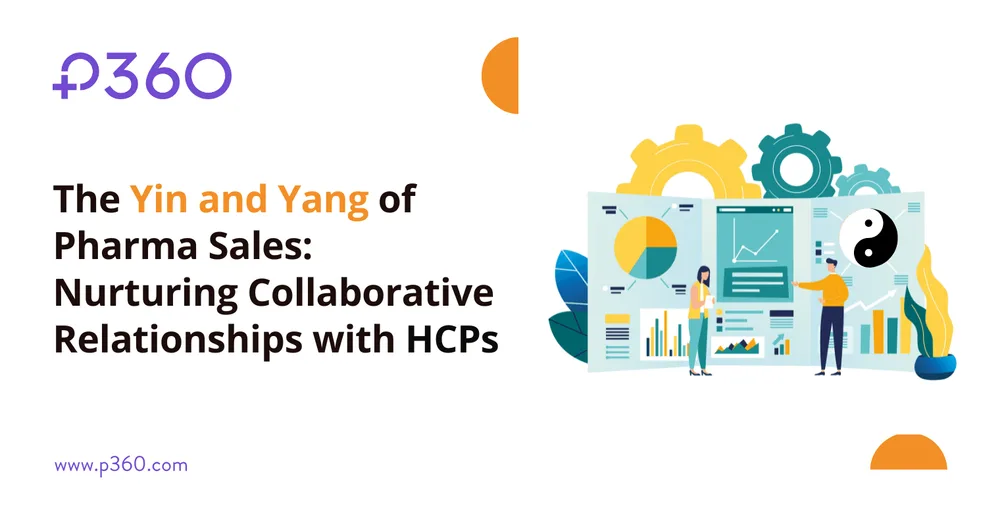The Yin and Yang of Pharma Sales: Nurturing Collaborative Relationships with HCPs

by Kathleen McQuade | Last Updated: August 28, 2024 | 1 min read
In the intricate world of healthcare, the relationship between pharmaceutical representatives (reps) and healthcare professionals (HCPs) is often seen through a lens of dichotomy. However, much like the ancient Chinese philosophy of yin and yang, these seemingly opposite roles are complementary, interconnected, and interdependent. Their collaboration helps shape diagnostic and therapeutic advancements, and they give rise to each other as they interrelate, ultimately working together to pursue better outcomes for patients in need.
Understanding the Yin and Yang of Pharma Sales
The concept of yin and yang symbolizes the idea that seemingly contradictory forces are actually interconnected and interdependent. Yin represents the passive, receptive, and nurturing aspects, while yang symbolizes the active, assertive, and driving forces. When applied to the context of pharma sales, HCPs can be seen as the "yin" to the reps' "yang." Both roles are essential and must work harmoniously to achieve the common goal of improved patient outcomes.

The Role of Pharmaceutical Representatives (Yang)
Pharmaceutical representatives serve as the driving force in the relationship, embodying the yang qualities with their proactive approach. Their primary responsibilities include:
-
Providing Information and Education: Reps offer valuable information about new medications, treatment options, and clinical data. By educating HCPs, they help bridge knowledge gaps and support informed decision-making in patient care.
-
Facilitating Access to Medications: Reps play a key role in ensuring that HCPs have access to the latest medications and therapies. They assist with navigating the complexities of formulary inclusion, insurance coverage, and patient assistance programs.
-
Supporting Adherence and Compliance: Through patient education materials and adherence programs, reps help HCPs encourage patients to stick to prescribed treatment regimens, enhancing therapeutic outcomes.
The Role of Healthcare Professionals (Yin)
Healthcare Professionals embody the yin qualities of receptiveness, care, and patient-centric focus. Their responsibilities include:
-
Delivering Patient Care: HCPs apply their clinical expertise to diagnose, treat, and manage patients' conditions. They rely on accurate and up-to-date information provided by reps to make the best therapeutic decisions.
-
Providing Feedback: HCPs offer critical feedback on the efficacy and safety of medications, sharing real-world experiences that inform future research and development efforts.
-
Educating Patients: HCPs educate patients on their conditions, treatment options, and the importance of adherence. They serve as trusted advisors, guiding patients through their healthcare journeys.
Explore More Relevant Articles on P360
- How Pharma Should Change its Messaging to Healthcare Professionals
- CIOs Look Beyond Traditional Sales Technologies to Better Engage with HCPs
- New Tech Connects HCPs and Pharma Sales Reps During Global Pandemic
- ZING Now Supercharged With New Enterprise-Grade Multimodal Features
- 5 Reasons Texting Is Better for Physician Engagement Than Email
The Changing Dynamics of HCP Engagement
The dynamics of HCP engagement have evolved significantly over the years. Historically, the relationship between pharma reps and HCPs were built primarily through in-person visits, where reps provided HCPs with the latest product information and research findings. This direct approach allowed for personalized interactions and the development of strong professional relationships. However, as the healthcare landscape has grown more complex, the ways in which reps interact with HCPs has also changed.
Several factors have driven this change, including technological advancements, which have revolutionized HCP engagement in numerous ways. Digital tools and platforms have enabled pharmaceutical reps to connect with HCPs more efficiently and effectively. Virtual collaboration and engagement tools, SMS messaging, and AI-powered information platforms have become commonplace, offering HCPs greater flexibility and convenience.
Regulatory changes have also played a significant role in reshaping HCP engagement. Increased scrutiny and regulations regarding the interactions between pharmaceutical companies and HCPs have necessitated greater transparency and compliance. HCPs' preferences for engagement have also evolved. Today's HCPs have limited time and increased workloads, making traditional in-person visits less feasible. They prefer on-demand, digital interactions that provide value without disrupting their busy schedules.
To adapt to these changing dynamics, pharmaceutical representatives must adopt best practices that align with the preferences and needs of HCPs. The following are Six strategies for effective HCP collaboration:
1. Become a Trusted Partner to HCPs: Building trust with healthcare professionals (HCPs) is essential for pharmaceutical representatives. HCPs aren't interested in mere sales pitches; they value partners who understand their challenges and offer solutions that enhance patient care. For HCPs, the primary benefit of relationships with pharma reps lies in their potential to improve patient outcomes. Therefore, trust is established through consistent, transparent communication and a demonstrated commitment to patient-centered care. When pharmaceutical reps provide value and dedication to ethical practices, HCPs are more likely to view them as valuable resources rather than just salespeople.
2. Provide Knowledge and Support: Reps must approach HCP engagement with a focus on delivering value. This means going beyond the basics of product promotion and offering real clinical insights that can improve patient outcomes. By staying informed about the latest developments in the healthcare field and understanding the specific needs of the HCPs they engage with, reps can position themselves as trusted advisors. This approach not only strengthens the relationship but also reinforces the rep's credibility in the eyes of the HCP.
3. Balance Product Information with Clinical Insights: While product knowledge is essential, effective HCP engagement requires a balance between providing detailed product information and offering broader clinical insights. Reps must be able to discuss how their products fit into the larger context of patient care, addressing both the practical and ethical considerations that HCPs face. This balanced approach ensures that engagements are both informative and relevant, ultimately leading to better patient care and stronger professional relationships.
4. Become a Continuous Learner: Continuous learning is crucial for maintaining relevance and expertise. Reps must stay updated with the latest advancements in medical research, product developments, and industry trends. This ongoing education allows reps to provide HCPs with accurate and current information, reinforcing their role as valuable partners. Knowledge sharing is equally important. By exchanging insights and best practices, both reps and HCPs can benefit from a deeper understanding of complex issues, leading to more informed decisions and better patient care.
5. Tailor Engagement to Individual HCP Needs: Personalized engagement is key to effective collaboration. Each HCP has unique needs and preferences, and reps should tailor their approaches accordingly. This means understanding the specific challenges that an HCP faces and offering solutions that address those needs. By customizing interactions, reps can build stronger relationships with HCPs and ensure that their support is both relevant and impactful.
6. Focus on Patient-Centered Outcomes: Patient-centered care is at the heart of HCP and rep engagement. This approach prioritizes the needs and preferences of patients, ensuring that they receive the best possible care. In every interaction, the goal is to improve patient outcomes. By focusing on patient-centered care, reps can help HCPs make more informed decisions that directly benefit patients.
At the end of the day, effective collaboration between pharma reps and HCPs is essential for achieving optimal patient outcomes and maintaining ethical standards in healthcare. By adopting strategies that emphasize continuous learning, personalized engagement, and a focus on patient-centered care, reps can enhance their relationships with HCPs and contribute to more successful interactions.
The Role of Technology in HCP Engagement
Digital tools, such as SMS messaging, two-way voice and video calling, onscreen collaboration, form sharing, signature capture, AI-assisted chat, inbound communications via QR code scanning, and more, play a significant role in promoting powerful HCP relationships. These technologies allow for more precise and timely communication, enabling HCPs to access the information they need when they need it. By facilitating these interactions, reps contribute to a more responsive and patient-focused healthcare system.

Here’s a deeper dive into some of the digital tools that are making a substantial impact on HCP engagement:
-
SMS Messaging: SMS messaging allows for quick and direct communication. It's a simple yet effective way to provide HCPs with updates, reminders, and important information. Given the busy schedules of HCPs, SMS ensures that critical messages are delivered and read promptly.
-
Two-Way Voice and Video Calling: Real-time interactions through voice and video calls can significantly enhance the quality of engagement. These tools allow reps to provide detailed explanations, answer questions, and offer support in a more personalized manner. Video calls, in particular, enable face-to-face interactions, which can help build trust and rapport.
-
Onscreen Collaboration: Onscreen collaboration tools enable reps and HCPs to work together on documents, presentations, and other resources in real time. This collaborative approach ensures that both parties are on the same page and can make decisions more efficiently.
-
Form Sharing and Signature Capture: Digital forms and signature capture technology streamline administrative tasks. HCPs can quickly fill out necessary forms and provide signatures electronically, reducing the need for physical paperwork and speeding up processes.
-
AI-Assisted Chat: AI-driven chatbots and virtual assistants can provide instant responses to common queries, freeing reps to focus on more complex interactions. These AI tools can also gather data from HCPs, helping pharmaceutical companies understand their needs and preferences better.
-
Inbound Communications via QR Code Scanning: QR codes placed on marketing materials or packaging allow HCPs to access specific information instantly. Scanning a code can lead to product details, instructional videos, or direct contact with a rep, making it a versatile tool for engagement.
-
Data Analytics for Personalized Interactions: Data analytics is another powerful tool in enhancing HCP and rep engagement. By analyzing data on HCP preferences, patient outcomes, and market trends, reps can tailor their interactions to meet the specific needs of each healthcare professional. This personalized approach not only strengthens the relationship between HCPs and reps but also aligns with the principles of patient-centered care.
The goal of leveraging these digital tools is to create a more responsive and patient-focused healthcare system. When HCPs have timely access to accurate information, they can make better decisions for their patients. Pharmaceutical reps play a crucial role in this ecosystem by facilitating these interactions and ensuring that HCPs are well-supported.
Importance of Ethical Practices
Trust is crucial in professional relationships, especially in healthcare. As such, pharmaceutical representatives must emphasize honesty and integrity when interacting with healthcare HCPs. Providing misleading information or engaging in unethical behavior can erode this trust, resulting in negative outcomes for both HCPs and their patients.
While adhering to legal standards is necessary, ethical engagement with HCPs goes beyond mere compliance. It requires a genuine commitment to improving patient outcomes and fostering an environment of respect and transparency. This dedication to ethics supports the development of a healthcare system where patient-focused care is the norm.
To elevate your team's ethical standards, consider integrating these elements into your approach:
-
Transparency in Communication: Transparency is crucial in all HCP engagements. Reps must provide clear, accurate, and unbiased information about their products and services. This honesty helps to build trust and ensures that HCPs can make informed decisions that align with their commitment to patient-centered care. By being transparent, reps demonstrate their dedication to ethical healthcare practices, which strengthens their professional relationships and enhances their credibility.
-
Adherence to Industry Guidelines and Regulations: Adherence to industry guidelines is another key aspect of ethical HCP engagement. Regulations governing the pharmaceutical industry are in place to protect both HCPs and patients. Reps must be well-versed in these guidelines to ensure that all interactions are compliant. This includes following proper procedures when sharing product information, conducting clinical trials, and discussing off-label uses. By adhering to these regulations, reps help to maintain the integrity of the healthcare industry and support ethical healthcare practices.
-
Prioritizing Patient Welfare Over Commercial Interests: The most important ethical consideration in HCP engagement is the prioritization of patient welfare. While commercial interests are a reality of the pharmaceutical industry, they should never take precedence over the well-being of patients. Reps must always keep patient-centered care at the forefront of their interactions with HCPs. This means offering solutions that are in the best interest of the patient, even if they do not directly benefit the rep’s commercial goals. By prioritizing patient welfare, reps contribute to a healthcare system that is both ethical and effective.
In an industry where patient welfare is paramount, maintaining high ethical standards is not just a legal requirement but a moral obligation. By focusing on transparency, strict adherence to industry guidelines, and prioritizing patient care, reps can ensure that their interactions with HCPs are both compliant and constructive.
Measuring the Impact of HCP Engagement in Pharmaceutical Sales
Interactions between HCPs and pharmaceutical representatives are not merely transactional; they are integral in enhancing patient care and achieving overarching healthcare goals. Therefore, pharmaceutical reps must understand and measure the impact of their HCP interactions. By focusing on key performance indicators (KPIs), patient outcomes, and HCP satisfaction, reps can ensure their efforts are effective and aligned with ethical healthcare practices.
Key Performance Indicators
To gauge the effectiveness of HCP engagement, several KPIs should be monitored. These metrics provide a quantitative framework to assess how well engagement strategies are being implemented and whether they meet HCP needs. Examples of KPIs include:
-
Frequency and Quality of Interactions: It is essential to track how often and how well reps interact with HCPs. More frequent and higher-quality interactions typically signify better engagement. Quality interactions involve meaningful exchanges where valuable information is shared, leading to a stronger professional relationship.
-
Level of Information Shared: The depth and relevance of information provided to HCPs are critical. Reps must ensure that the information they share is current, evidence-based, and directly applicable to the HCPs' practice. This could involve updates on new research, treatment guidelines, or product information as examples.
-
Response Times: How quickly reps respond to HCP inquiries can significantly impact the relationship. Prompt and thorough responses demonstrate reliability and support, fostering trust and satisfaction.
By meticulously tracking these KPIs, pharmaceutical reps can make data-driven decisions to refine their engagement strategies, ultimately enhancing their effectiveness.
Patient Outcome Improvements
Perhaps the most significant measure of engagement impact lies in patient outcomes. Effective HCP engagement should translate into tangible health benefits for patients. Examples of these measures include:
-
Changes in Patient Health Metrics: Monitoring changes in patient health metrics provides direct evidence of the impact of HCP engagement. These metrics can offer insights into how well patients are responding to treatments discussed during HCP engagements.
-
Treatment Adherence Rates: Another crucial factor is treatment adherence. When reps provide HCPs with comprehensive and clear information, it enables HCPs to better communicate the importance of adherence to their patients. Improved adherence rates often lead to better health outcomes.
-
Overall Patient Satisfaction: Patient satisfaction is a holistic measure that encompasses many aspects of healthcare delivery. Higher satisfaction rates indicate that patients feel better informed, supported, and cared for, which reflects positively on the quality of engagement between reps and HCPs.
By continuously monitoring these patient outcome improvements, pharmaceutical reps can ensure their efforts contribute meaningfully to patient-centered care.
HCP Satisfaction and Trust Metrics
The success of HCP engagement is heavily reliant on the satisfaction and trust of HCPs themselves. Building and maintaining positive relationships with HCPs is essential for effective engagement. The following are a few ways this information can be collated:
-
Surveys and Feedback Mechanisms: Conducting regular surveys and soliciting feedback from HCPs can provide valuable insights into their satisfaction levels. Questions should address various aspects of the engagement, such as the quality of information provided, the professionalism of the rep, and overall experience.
-
Trust in Information Provided: The trust HCPs have in the information provided by reps is a critical metric. This can be assessed through direct feedback or inferred from the frequency of follow-up interactions and requests for additional information.
-
Perception of Rep's Professionalism: HCPs' perception of the rep's professionalism can significantly influence their willingness to engage. This encompasses factors like the rep’s knowledge, communication skills, and ethical conduct.
High levels of satisfaction and trust indicate that engagement strategies are effective and that reps are successfully building ethical and positive relationships with HCPs.
Future Trends in HCP Engagement
While evaluating all that has been covered above, it’s also important to remember that the HCP engagement landscape is constantly transforming. Emerging technologies and evolving regulatory frameworks are shaping the future of these interactions, making it essential for reps to stay ahead of these trends. By understanding key areas such as artificial intelligence, real-time collaboration, and regulatory changes, pharmaceutical reps can continue to engage effectively with HCPs and support patient-centered care.

Artificial Intelligence and Predictive Analytics
Artificial intelligence (AI) and predictive analytics are game changers in HCP engagement. AI tools can analyze massive datasets to predict HCP needs and preferences, allowing reps to tailor their interactions more effectively. Here’s how:
-
Personalized Interactions: AI enables reps to offer personalized support that aligns with the specific requirements of each HCP, enhancing the quality of their engagements.
-
Trend Forecasting: Predictive analytics can forecast trends and identify potential opportunities for engagement, making the strategic approach of reps more effective.
-
Enhanced Efficiency: This technology improves efficiency by automating repetitive tasks, allowing reps to focus on building meaningful relationships.
-
Patient-Centered Care: By enabling more targeted and relevant interactions, AI supports patient-centered care, ensuring that HCPs get the information they need to make informed decisions.
Real-Time Collaboration in Product Education
Technology is also transforming product education, providing interactive and immersive learning experiences that are crucial for effective HCP engagement.
-
Interactive Learning: Technology is offering new ways for HCPs to interact with branded educational content. These tools can simulate real-world scenarios, allowing HCPs to understand complex treatments in a controlled environment.
-
Continuous Learning: Online platforms enable continuous learning opportunities, where HCPs can access the latest research, guidelines, and best practices. Reps can leverage these platforms to facilitate educational sessions and collaborative discussions.
-
Enhanced Engagement: Real-time collaboration tools allow for instant communication and feedback, fostering a more dynamic and engaging learning experience. Reps can use these tools to stay connected with HCPs, providing ongoing support and expertise.
Regulatory Changes
The regulatory environment for HCP engagement is continually evolving, with new guidelines aimed at ensuring ethical practices. Here’s how reps can adapt:
-
Staying Informed: Reps must stay updated on new regulations to remain compliant and maintain trust with HCPs.
-
Adapting Engagement Strategies: New regulations often require reps to update their engagement strategies and refine their communication approaches.
-
Ensuring Compliance: All interactions must adhere to the latest standards, which will involve ongoing training and development for reps.
-
Building Ethical Relationships: By staying ahead of regulatory trends, reps can build strong, ethical relationships with HCPs while supporting patient-centered care.
Increased Oversight
Regulatory changes will ultimately lead to increased regulatory oversight, which will significantly influence pharma-to-HCP relationships. Ethical healthcare practices are now more critical than ever, with strict guidelines in place to ensure transparency and compliance. This will lead to:
-
Structured Engagement Strategies: More structured and accountable engagement strategies focus on providing value-driven information.
-
Transparent Interactions: Ensuring that all interactions remain transparent and compliant builds trust between reps and HCPs.
-
Value-Driven Information: The focus is on providing information that supports patient-centered care, while adhering to ethical principles.
This ongoing transformation in HCP engagement highlights the importance of adapting to modern technologies and regulatory environments. By embracing these changes, reps can continue to build meaningful relationships with HCPs, ensuring that the needs of both the healthcare professional and their patients are met effectively.
Final Thoughts
The relationship between pharmaceutical representatives and healthcare professionals is a delicate balance, much like the yin and yang. While their roles may seem distinct, they are inherently connected and essential for the advancement of healthcare. By fostering a collaborative environment built on mutual respect, open communication, and shared goals, both pharma reps and HCPs can work collaboratively to achieve better outcomes for patients.
If you’re ready to enhance your engagement strategies, book a consultation with our experts today: https://www.p360.com/contact